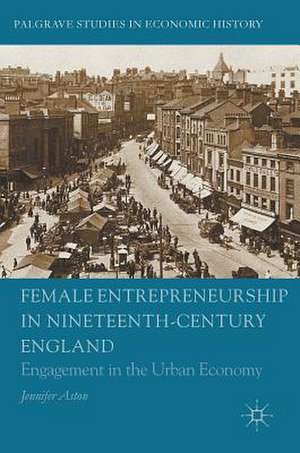Female Entrepreneurship in Nineteenth-Century England: Engagement in the Urban Economy: Palgrave Studies in Economic History
Autor Jennifer Astonen Limba Engleză Hardback – 22 aug 2016
Sources including trade directories, census returns, probate records, newspapers, advertisements, and photographs are analysed and linked to demonstrate conclusively that women in nineteenth-century England were far more prevalent in business than previously acknowledged. Moreover, women were able to establish and expand their businesses far beyond the scope of inter-generational caretakers in sectors of the economy traditionally viewed as unfeminine, and acquire the assets and possessions that were necessary to secure middle-class status. These women serve as a powerful reminder that the middle-class woman’s retreat from economic activity during the nineteenth-century, so often accepted as axiomatic, was not the case. In fact, women continued to act as autonomous and independent entrepreneurs, and used business ownership as aplatform to participate in the economic, philanthropic, and political public sphere.
| Toate formatele și edițiile | Preț | Express |
|---|---|---|
| Paperback (1) | 723.69 lei 6-8 săpt. | |
| Springer International Publishing – 22 apr 2018 | 723.69 lei 6-8 săpt. | |
| Hardback (1) | 727.97 lei 6-8 săpt. | |
| Springer International Publishing – 22 aug 2016 | 727.97 lei 6-8 săpt. |
Din seria Palgrave Studies in Economic History
-
 Preț: 497.34 lei
Preț: 497.34 lei -
 Preț: 358.22 lei
Preț: 358.22 lei - 15%
 Preț: 580.36 lei
Preț: 580.36 lei - 20%
 Preț: 939.29 lei
Preț: 939.29 lei -
 Preț: 292.28 lei
Preț: 292.28 lei - 17%
 Preț: 361.80 lei
Preț: 361.80 lei -
 Preț: 357.89 lei
Preț: 357.89 lei - 20%
 Preț: 690.48 lei
Preț: 690.48 lei - 17%
 Preț: 361.39 lei
Preț: 361.39 lei - 18%
 Preț: 945.79 lei
Preț: 945.79 lei - 18%
 Preț: 1012.53 lei
Preț: 1012.53 lei - 15%
 Preț: 700.29 lei
Preț: 700.29 lei - 18%
 Preț: 782.42 lei
Preț: 782.42 lei -
 Preț: 232.82 lei
Preț: 232.82 lei - 15%
 Preț: 644.82 lei
Preț: 644.82 lei -
 Preț: 384.31 lei
Preț: 384.31 lei - 15%
 Preț: 587.85 lei
Preț: 587.85 lei - 18%
 Preț: 899.21 lei
Preț: 899.21 lei - 18%
 Preț: 786.66 lei
Preț: 786.66 lei -
 Preț: 397.97 lei
Preț: 397.97 lei -
 Preț: 388.90 lei
Preț: 388.90 lei - 18%
 Preț: 737.57 lei
Preț: 737.57 lei -
 Preț: 387.20 lei
Preț: 387.20 lei - 15%
 Preț: 647.73 lei
Preț: 647.73 lei - 15%
 Preț: 646.62 lei
Preț: 646.62 lei -
 Preț: 419.06 lei
Preț: 419.06 lei - 15%
 Preț: 459.06 lei
Preț: 459.06 lei - 15%
 Preț: 712.22 lei
Preț: 712.22 lei - 18%
 Preț: 787.47 lei
Preț: 787.47 lei - 18%
 Preț: 1128.57 lei
Preț: 1128.57 lei - 18%
 Preț: 949.55 lei
Preț: 949.55 lei - 15%
 Preț: 471.53 lei
Preț: 471.53 lei - 15%
 Preț: 640.88 lei
Preț: 640.88 lei - 18%
 Preț: 898.26 lei
Preț: 898.26 lei - 18%
 Preț: 1394.21 lei
Preț: 1394.21 lei -
 Preț: 422.90 lei
Preț: 422.90 lei - 18%
 Preț: 955.40 lei
Preț: 955.40 lei - 18%
 Preț: 730.47 lei
Preț: 730.47 lei - 15%
 Preț: 711.56 lei
Preț: 711.56 lei - 18%
 Preț: 783.98 lei
Preț: 783.98 lei - 18%
 Preț: 900.01 lei
Preț: 900.01 lei - 18%
 Preț: 896.08 lei
Preț: 896.08 lei - 15%
 Preț: 705.83 lei
Preț: 705.83 lei - 18%
 Preț: 787.15 lei
Preț: 787.15 lei - 15%
 Preț: 704.69 lei
Preț: 704.69 lei - 18%
 Preț: 1112.48 lei
Preț: 1112.48 lei
Preț: 727.97 lei
Preț vechi: 887.76 lei
-18% Nou
Puncte Express: 1092
Preț estimativ în valută:
139.30€ • 151.78$ • 117.38£
139.30€ • 151.78$ • 117.38£
Carte tipărită la comandă
Livrare economică 23 aprilie-07 mai
Preluare comenzi: 021 569.72.76
Specificații
ISBN-13: 9783319308791
ISBN-10: 3319308793
Pagini: 246
Ilustrații: XVII, 257 p. 31 illus., 3 illus. in color.
Dimensiuni: 148 x 210 x 22 mm
Greutate: 0.45 kg
Ediția:1st ed. 2016
Editura: Springer International Publishing
Colecția Palgrave Macmillan
Seria Palgrave Studies in Economic History
Locul publicării:Cham, Switzerland
ISBN-10: 3319308793
Pagini: 246
Ilustrații: XVII, 257 p. 31 illus., 3 illus. in color.
Dimensiuni: 148 x 210 x 22 mm
Greutate: 0.45 kg
Ediția:1st ed. 2016
Editura: Springer International Publishing
Colecția Palgrave Macmillan
Seria Palgrave Studies in Economic History
Locul publicării:Cham, Switzerland
Cuprins
Introduction.- Chapter 1: Locating Female Business Owners in the Historiography.- Chapter 2: Women and their Businesses.- Chapter 3: Who was the Victorian Businesswoman?.- Chapter 4: The Social Network.- Chapter 5: Life After Death.- Conclusion.
Notă biografică
Jennifer Aston is Junior Research Fellow and Retained Lecturer in History at Pembroke College, Oxford, and Research Assistant on the ESRC-funded Professions in Nineteenth Century Britain project, History Faculty, Oxford, UK. She previously held the Eileen Power Research Fellowship at the Institute of Historical Research, School of Advanced Study, University of London, UK. Her research focuses on gender, entrepreneurship and business in nineteenth-century Britain.
Textul de pe ultima copertă
Aston challenges and reshapes the on-going debate concerning social status, economic opportunity, and gender roles in nineteenth-century society.
Sources including trade directories, census returns, probate records, newspapers, advertisements, and photographs are analysed and linked to demonstrate conclusively that women in nineteenth-century England were far more prevalent in business than previously acknowledged. Moreover, women were able to establish and expand their businesses far beyond the scope of inter-generational caretakers in sectors of the economy traditionally viewed as unfeminine, and acquire the assets and possessions that were necessary to secure middle-class status. These women serve as a powerful reminder that the middle-class woman’s retreat from economic activity during the nineteenth-century, so often accepted as axiomatic, was not the case. In fact, women continued to act as autonomous and independent entrepreneurs, and used business ownership as a platform to participate in the economic, philanthropic, and political public sphere.
Sources including trade directories, census returns, probate records, newspapers, advertisements, and photographs are analysed and linked to demonstrate conclusively that women in nineteenth-century England were far more prevalent in business than previously acknowledged. Moreover, women were able to establish and expand their businesses far beyond the scope of inter-generational caretakers in sectors of the economy traditionally viewed as unfeminine, and acquire the assets and possessions that were necessary to secure middle-class status. These women serve as a powerful reminder that the middle-class woman’s retreat from economic activity during the nineteenth-century, so often accepted as axiomatic, was not the case. In fact, women continued to act as autonomous and independent entrepreneurs, and used business ownership as a platform to participate in the economic, philanthropic, and political public sphere.
Caracteristici
Contributes to the revisionist historiography of women in business Challenges and reshapes the on-going debate concerning social status, economic opportunities and gender roles in nineteenth-century society Examines the two important Victorian cities of Birmingham and Leeds Proves that the commonly held view that the middle-class women retreated from economic activity during the nineteenth-century was not the case and in fact women continued to act as autonomous and independent entrepreneurs Individual experiences of 100 businesswomen are used to introduce and illustrate key themes and arguments










